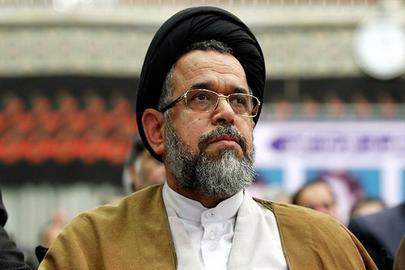Iran’s Intelligence Minister has called for the release of up to 12 administrators for Telegram, the online messaging service.
Following a cabinet meeting on Wednesday, April 5, Mahmoud Alavi told reporters [Persian link] that the government had not supported the arrest of the online administrators in March 2017, but gave no further details about whether it planned to take any action.
Alavi also gave no indication whether President Rouhani and his ministers will respond to the recent arrests of journalists, which were carried out by the Iranian judiciary and the Revolutionary Guards’ Intelligence Unit. Many observers believe that the arrests are part of a larger agenda adopted by Iran’s hardliner factions in the run-up to presidential and local council elections, due to take place in May.
The Telegram admins and journalists that have been arrested in recent weeks are generally regarded to be pro-Rouhani and reformist. They include Morad Saghafi, who was arrested after criticizing Tehran mayor Mohammad Bagher Ghalibaf, Hengameh Shahidi, Tahereh Riahi and Zeinab Karimian. Ehsan Mazandarani was also re-arrested on March 12 after being released for a period of a few weeks.
The intelligence minister’s announcement has been seen as an exercise in public relations, an attempt at damage control following outcry from pro-Rouhani figures and five members of the parliament, who all said the arrests were politically motivated. On March 8, Mahmoud Sadeghi, a representative from Tehran, wrote a letter (Persian link) to General Mohammad Ali Jafari, the commander-in-chief of the Revolutionary Guards, expressing deep concern about the arrests and reminding him that the general himself, in a speech on March 7, had told his commanders: “not a single member or commander of the Revolutionary Guards has the right to intervene [in the elections] by taking a political or factional side.”
Following the arrest of Ali Ahmadnia, the administrator of the Telegram channel Eslahat (“Reform”) News, and other reformist journalists, Iranian parliament’s Deputy Speaker Ali Motahari lashed out at the head of Iran’s Intelligence Ministry, demanding that he be called in for questioning. Motahari warned that if the ministry could not thoroughly explain the motives behind the recent arrests, he would summon the intelligence minister for questioning, or even ask parliament to begin the process of impeaching him. Motahari said he had learned that a military intelligence agency had arrested approximately 12 administrators for reformist or pro-Rouhani Telegram channels.
Telegram has gained importance as a campaign tool in Iran, particularly over the last year. It is primarily used by pro-Rouhani and reformist activists. This fact has not escaped the attention of hardliners and their two major power bases, the judiciary and the Revolutionary Guards. Telegram is also popular with other campaigning and political groups. In February, the Revolutionary Court in the Kurdish city of Saghez sentenced four people to prison for “propaganda in support of Kurdish opposition parties” after they set up a group and channel on Telegram. Intelligence agents anonymously joined the Telegram channels set up by the accused, and took screenshots of their comments and posts. The screenshots were then used as evidence against them in court.
visit the accountability section
In this section of Iran Wire, you can contact the officials and launch your campaign for various problems

























comments